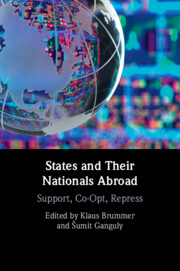Book contents
- States and Their Nationals Abroad
- States and Their Nationals Abroad
- Copyright page
- Dedication
- Contents
- Figures
- Tables
- Contributors
- 1 States’ Interactions with Their National Communities Abroad
- 2 India
- 3 Mexico
- 4 Russia
- 5 China
- 6 Pakistan
- 7 Philippines
- 8 The United Kingdom
- 9 Indonesia
- 10 Germany
- 11 Egypt
- 12 Türkiye
- 13 The United States
- 14 Comparative Insights into States’ Support, Co-optation, and Repression of Their National Communities Abroad
- Index
- References
10 - Germany
Supportive in Times of Crisis
Published online by Cambridge University Press: 04 December 2024
- States and Their Nationals Abroad
- States and Their Nationals Abroad
- Copyright page
- Dedication
- Contents
- Figures
- Tables
- Contributors
- 1 States’ Interactions with Their National Communities Abroad
- 2 India
- 3 Mexico
- 4 Russia
- 5 China
- 6 Pakistan
- 7 Philippines
- 8 The United Kingdom
- 9 Indonesia
- 10 Germany
- 11 Egypt
- 12 Türkiye
- 13 The United States
- 14 Comparative Insights into States’ Support, Co-optation, and Repression of Their National Communities Abroad
- Index
- References
Summary
The chapter explores how Germany engages with its nationals abroad, covering the diplomatic/consular, economic/social and military dimensions. As of 2020, around 2.9 million Germans permanently lived outside Germany, mostly in other European countries and North America, and approximately 24 million Germans went abroad for their main holidays in 2021. The chapter finds that Germany’s activities towards these German nationals residing or travelling abroad is relatively limited overall, with a focus on supporting and assisting German citizens. There is only little evidence for policies to co-opt Germans abroad, for example in the context of return schemes for highly-skilled German citizens, and no indication for repression at all, as befits a liberal democracy. While Germany’s engagement is typically of low domestic salience, Germany can mobilize significant resources to support its nationals abroad at times of crisis (e.g., natural disasters or hostage situations), in particular through its global diplomatic network. Germany has also used its armed forces for military evacuations from conflict zones, often in close coordination with its European and transatlantic partners. Germany can thus be described as a capable protector that is, however, reluctant to engage with its national communities abroad on a more comprehensive and proactive basis.
- Type
- Chapter
- Information
- States and their Nationals AbroadSupport, Co-Opt, Repress, pp. 230 - 255Publisher: Cambridge University PressPrint publication year: 2024

